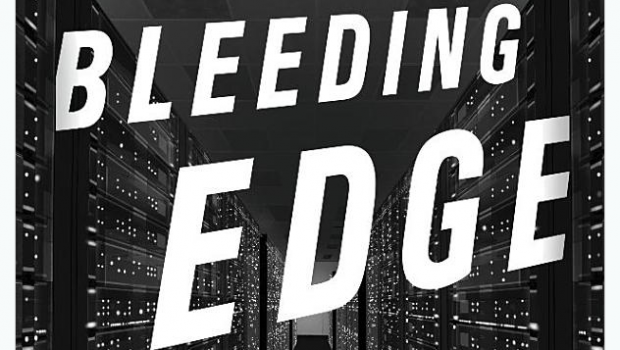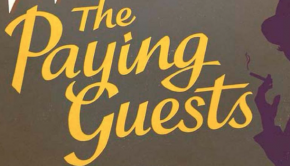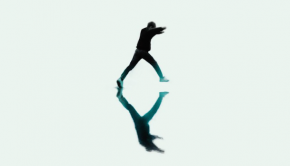Bleeding Edge by Thomas Pynchon
| Press reviews | Buy the book | Have your say |
Blurb: It is 2001 in New York City, in the lull between the collapse of the dotcom boom and the terrible events of September 11th. Silicon Alley is a ghost town, Web 1.0 is having adolescent angst, Google has yet to IPO, Microsoft is still considered the Evil Empire. There may not be quite as much money around as there was at the height of the tech bubble, but there’s no shortage of swindlers looking to grab a piece of what’s left. Maxine Tarnow is running a nice little fraud investigation business on the Upper West Side, chasing down different kinds of small-scale con artists. She used to be legally certified but her licence got pulled a while back. Otherwise, just your average working mum – two boys in elementary school, an off-and-on situation with her sort of semi-ex-husband Horst, life as normal as it ever gets in the neighbourhood – till Maxine starts looking into the finances of a computer-security firm and its billionaire geek CEO, whereupon things begin rapidly to jam onto the subway and head downtown. (Jonathan Cape, 2013)
Peter Kemp, The Times
“It takes time and effort to see where the author of Bleeding Edge is coming from. Two words nail it: Entropy and Paranoia. Entropy (the title of Pynchon’s first significant work of fiction) posits that things disorganise more easily than they organise … In Pynchon’s fiction plot is a constant process of construction and deconstruction. A reality forever dissolving and reordering itself. Paranoia is the opposite. It’s plot gone wild. Nothing is random or accidental for the paranoid mind … Bleeding Edge is entropic in its plottery and joyously paranoid in its world view.”
Tim Martin, The Telegraph
“The jokes in this novel, incidentally, are superb, with the comic tone perhaps a career high point: it’s certainly enough to dispel the reader’s traumatic memories of the infamous 11-page Kenosha Kid joke in Gravity’s Rainbow or the arch Chums of Chance sequences in Against the Day. Always a comprehensive researcher, Pynchon has dug deep into Noughties geek culture and consumerism, transmuting this unpromising base matter into a glittering sequence of gags and puns.”
Stuart Kelly, The Scotsman
“This is Pynchon’s 9/11 novel… Bleeding Edge takes its title from a tech term: bleeding edge technologies, those very new forms taken up by early-adopters despite a high risk of unreliability and a potential greater loss. But it is, typically, a pun: the bleeding edge is the wound, the point where the weapon meets the flesh. Thomas Pynchon, America’s greatest novelist, has written the greatest novel about the most significant events in his country’s 21st century history. It is unequivocally a masterpiece..”
Michael Dirda, The Washington Post
“There are, in fact, jokes and puns and put-downs on nearly every page of Bleeding Edge — the conversations between Maxine and her lifelong friend Heidi are particularly catty, affectionate and vulgar. But laughter can’t stave off the book’s encroaching darkness. A former hashslingrz associate is found with a knife blade driven through his skull … Near the end of Bleeding Edge, Maxine’s father, Ernie, argues that the Internet isn’t really about empowerment, it’s about control. “Everybody connected together, impossible anybody should get lost, ever again. Take the next step, connect it to these cell phones, you’ve got a total Web of surveillance, inescapable.” It’s “what they dream about at the Pentagon, worldwide martial law.” Who, in the era of Edward Snowden, can say he’s wrong?”
Jonathan Lethem, The New York Times
“Thomas Pynchon is 76, and his refusal to develop a late style is practically infuriating. The man’s wildly consistent: the only reason Bleeding Edge couldn’t have been published in 1973 is that the Internet, the Giuliani/Disney version of Times Square and the war on terror hadn’t come along yet. This book, and Inherent Vice, make jubilant pendants on his mammoth enterprise, neon signposts to themes he took no trouble to hide in the first place.”
Keith Miller, Literary Review
“The book’s satirical elements are pitch perfect, or very nearly. Pynchon’s gift for pastiche - Bleeding Edge is peppered with cod lyrics, like many of its predecessors – is exact enough (and it’s impressive that a 76-year-old has observed the Sondheimish sprung rhythms of 2001 hip-hop) but never pedantic. His weakness for a pun or a kooky neologism is rarely absent (there’s a go-go bar called the Joie de Beavre), but this accurately reflects a certain deranged inventiveness on the part of what it’s regrettably no longer fashionable to call late capitalism.”
Leo Robson, The New Statesman
“The book isn’t just a rewriting of his 1966 novel The Crying of Lot 49 (female detective gets laid, makes friends and goes bar-hopping in pursuit of an evil corporation) with the Manichaean crudeness scrubbed away and added doses of agility and charm. It is also the closest that Pynchon has yet come to writing a “traditional realistic novel” – the only kind “worth a shit”, he suggested in a letter 50 years ago; the kind he hoped he would “some day” write. OK, OK, so Maxine is still a shaggy dog surrounded by wild geese – Pynchon hasn’t had a personality transplant or anything – but there is a narrative arc that can be followed, just about, and even the names are plausible if you allow for a whole extended community whose parents had a thing for porn and comic books (the villain is called Gabriel Ice).”
Thomas Jones, The Financial Times
“There’s plenty of space within the pattern for Pynchon’s trademark digressions (flashbacks interrupt flashbacks like a cascade of pop-up windows from a dodgy website), songs, terrible puns (while Pynchon’s novels are frequently very funny, his characters’ jokes are not), and some magnificent set pieces, including a speedboat chase through New York’s harbour, “the World Trade Center leaning, looming brilliantly curtained in light gigantically off their port quarter”, on past the mountains of landfill on Staten Island, “toxicity central, the dark focus of Big Apple waste disposal, everything the city has rejected so it can keep on pretending to be itself”.”
John Dugdale, The Sunday Times
“While far from flawless, Bleeding Edge offers a winning heroine, scintillating screwball dialogue and a typical host of weird, zany or depraved characters, this time corralled into a tighter-than-usual plot … What is missing, though, is the mordancy with which comparable figures are characterised in the paranoia-powered novels of the 1960s and 1970s. Convincing villains are tellingly absent from Pynchon’s predominantly comic later work, and Ice (though fairly clearly a killer, and possibly complicit in mass murder) is a phoney, unscary bad guy, half-heartedly assembled from clichés.”
Christian Lorentzen, The London Review of Books
“The passage echoes the first pages of Gravity’s Rainbow, about evacuees fleeing German rocket attacks in London, but mostly the novel avoids the earlier book’s long sentences and stately tone. The narrative voice in Bleeding Edge is warmer: it’s omniscient and at times essayistic but more often casual, chatty and in the present tense. Pynchon has an almost fatherly fondness for his characters, even though the force of his own voice at times makes them seem like pawns being moved around Manhattan’s grid. He takes an obvious pleasure in the game: in his gags and obscurities, in storytelling, and in chronicling the wasted days and nights of a scene that flickered for a few years and then burned out.”
Michiko Kakutani, The New York Times
“In his latest novel, Bleeding Edge, Mr. Pynchon tackles Sept. 11 head-on. And he also addresses the other great contemporary subject — the Internet and its transformation of our world — that happens to mesh so completely with his enduring fascination with hidden connections, alternate realities and the plight of people caught up in the gears of a ravenous and gargantuan techno-political machine. The result, disappointingly, is a scattershot work that is, by turns, entertaining and wearisome, energetic and hokey, delightfully evocative and cheaply sensational; dead-on in its conjuring of zeitgeist-y atmospherics, but often slow-footed and ham-handed in its orchestration of social details.”
Mark Sanderson, London’s Evening Standard
“Pynchon, being a historical novelist, is a master of hindsight. His e-vocations (sic) of outmoded hardware, superseded software and, above all, cobwebby code will be “nerdvana” for middle-aged gamers. Pynchon loves his puns. What better name is there for a strip club than Joie de Beavre? Indeed, Bleeding Edge — named after technology that is “no proven use, high risk, something only early-adoption addicts feel comfortable with” — is very much for his fans … If only Pynchon wouldn’t let himself go on so much, if only he used the delete key more.”
Talitha Stevenson, The Guardian
“The risk inherent in questioning the motive behind any joke, in suggesting that its value may be aggressive and its motivation cynical in nature, is that it seems to expose a fun-factor deficiency in the questioner. But, like the intellectual flattery, the pop-culture jokes in Bleeding Edge – there’s an emphasis on the sitcom Friends in particular – are soon insulting. Pynchon aims his gags hyper-consciously at the point where he anticipates the reader’s belief in her own sense of irony meets with her intellectual self-satisfaction, just at the safe (ie the unexamined) edge of a depressive nihilism which might get sad thrills laughing at Susan Sontag’s hair. There is certainly contempt here – but what’s beneath it doesn’t seem a lot like sympathy.”
Theo Tait, The Guardian
“Pynchon seems to have eliminated not just the creaky conventions of the realist novel, but most of the human interest, too. This postmodern novel, like many others, often degenerates into a crude cartoon; and it looks particularly grievous when, like so many postmodernists, he tries to hack a path back through all that irony and pastiche to sincerity. Behind Pynchon’s vast fictional panoply, behind the excess knowledge relentlessly peddled, you see something less than godlike: a set of urban liberal whines, about Rudy Giuliani’s mayoralty, “yups” (yuppies) colonising Manhattan, and the Disneyfication of Times Square; along with political thinking that, at best, occupies “the woowoo end of the spectrum” and at worst seems downright adolescent.”
Pat Kane, The Independent
“The New York of the late 1990s dotcom boom-and-bust, frittering away into the violent event-horizon of 9/11, is adequately captured by the title – but only adequately. Indeed, it seems beneath Pynchon to be to so painstakingly geeky about the socio-linguistics of this thin, weightless, credit-extended period – its luxury-pad fittings, its designer shoe labels, its bloviating biz-speak.Compared to the techno-fictions of William Gibson – for years, an author happily scuffling around on Pynchon’s giant shoulders – Bleeding Edge’s digital shenanigans are, to be honest, a little vicar- at-the-disco-ish.”
Buy the book
Amazon | Foyles | Hive | Waterstones












